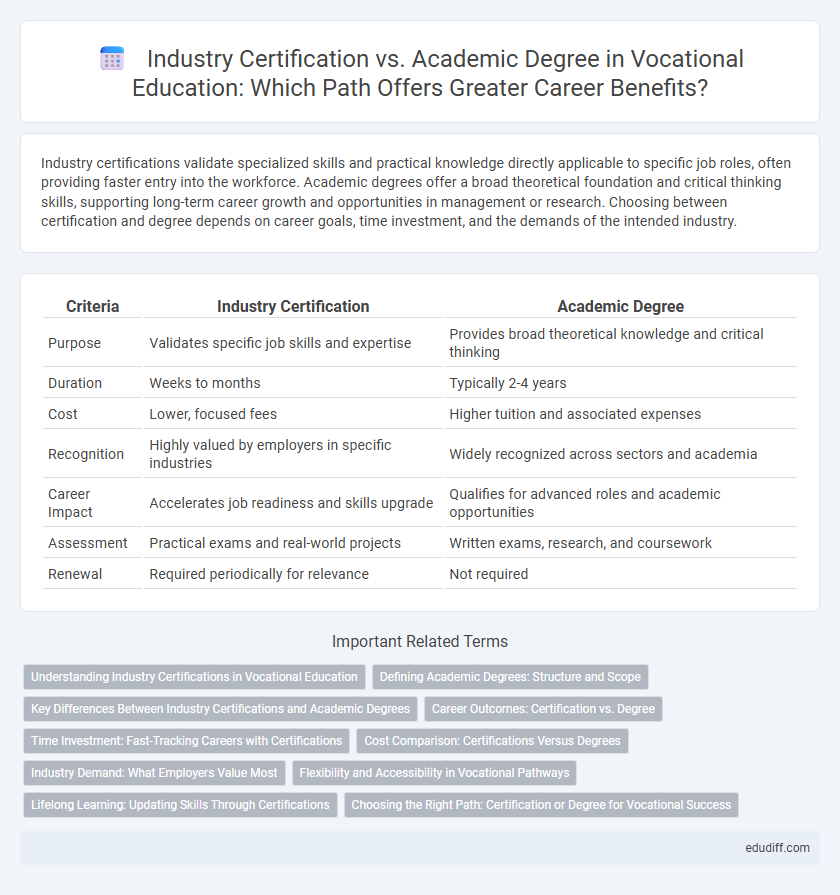Industry certifications validate specialized skills and practical knowledge directly applicable to specific job roles, often providing faster entry into the workforce. Academic degrees offer a broad theoretical foundation and critical thinking skills, supporting long-term career growth and opportunities in management or research. Choosing between certification and degree depends on career goals, time investment, and the demands of the intended industry.
Table of Comparison
| Criteria | Industry Certification | Academic Degree |
|---|---|---|
| Purpose | Validates specific job skills and expertise | Provides broad theoretical knowledge and critical thinking |
| Duration | Weeks to months | Typically 2-4 years |
| Cost | Lower, focused fees | Higher tuition and associated expenses |
| Recognition | Highly valued by employers in specific industries | Widely recognized across sectors and academia |
| Career Impact | Accelerates job readiness and skills upgrade | Qualifies for advanced roles and academic opportunities |
| Assessment | Practical exams and real-world projects | Written exams, research, and coursework |
| Renewal | Required periodically for relevance | Not required |
Understanding Industry Certifications in Vocational Education
Industry certifications in vocational education validate specialized skills and practical knowledge directly aligned with workforce demands, offering targeted credentials that enhance employability. These certifications are typically issued by recognized professional organizations or industry leaders, ensuring relevance and up-to-date competencies in fields like IT, healthcare, and skilled trades. Unlike traditional academic degrees, industry certifications emphasize hands-on experience and immediate job readiness, making them crucial for career advancement in rapidly evolving technical sectors.
Defining Academic Degrees: Structure and Scope
Academic degrees typically consist of structured programs with a defined curriculum spanning multiple years, designed to provide comprehensive theoretical knowledge and practical skills. These degrees include associate, bachelor's, master's, and doctoral levels, each progressively deepening expertise within a specific discipline. The scope of academic degrees extends beyond immediate job readiness, emphasizing critical thinking, research, and broad intellectual development applicable across various industries.
Key Differences Between Industry Certifications and Academic Degrees
Industry certifications validate specific skills and practical knowledge directly applicable to job roles, often requiring shorter preparation periods and offering immediate value in the labor market. Academic degrees encompass comprehensive theoretical education and broader subject areas, typically spanning several years and providing foundational knowledge along with critical thinking skills. Employers often prioritize certifications for technical proficiency and degrees for holistic expertise, making the choice dependent on career goals and industry demands.
Career Outcomes: Certification vs. Degree
Industry certifications provide specialized skills tailored to specific job roles, often leading to faster entry into the workforce and higher initial earning potential in technical fields. Academic degrees offer broad foundational knowledge and critical thinking abilities that can open doors to a wider range of career opportunities and long-term advancement. Employers frequently value certifications for demonstrating up-to-date expertise, while degrees are seen as indicators of comprehensive education and professional maturity.
Time Investment: Fast-Tracking Careers with Certifications
Industry certifications typically require significantly less time to complete compared to academic degrees, often taking weeks to a few months. This accelerated timeline enables professionals to quickly acquire specialized skills and enter the workforce or advance in their careers without extended educational commitments. Employers frequently value certifications for their practical, up-to-date knowledge, making them a strategic choice for fast-tracking career growth in vocational fields.
Cost Comparison: Certifications Versus Degrees
Industry certifications typically cost between $100 and $2,000, offering affordable, targeted expertise compared to academic degrees that can range from $20,000 to $100,000 or more for a four-year program. Certifications provide quicker access to job-ready skills without the high tuition fees, while degrees often entail additional expenses like textbooks, housing, and transportation. Employers increasingly recognize certifications for specific vocational skills, making them a cost-effective alternative to traditional academic pathways.
Industry Demand: What Employers Value Most
Employers in vocational fields prioritize industry certifications over academic degrees due to their direct relevance and practical skill validation. Industry certifications demonstrate proficiency in specific tools, technologies, and standards that align with current market demands. This focus reflects a growing trend where hands-on experience and up-to-date technical knowledge are more valued than theoretical academic credentials.
Flexibility and Accessibility in Vocational Pathways
Industry certifications offer greater flexibility and accessibility by providing targeted skills training and shorter completion times compared to traditional academic degrees. These certifications can often be earned online or through part-time study, making them ideal for working professionals and individuals seeking quick entry or advancement in vocational fields. Academic degrees, while comprehensive, require a more rigid commitment and longer duration, potentially limiting access for those needing immediate workforce integration.
Lifelong Learning: Updating Skills Through Certifications
Industry certifications offer targeted skill validation that aligns with evolving job market demands, providing professionals with timely updates on technical competencies. Lifelong learning through certifications enables individuals to maintain relevance and adaptability without the extended time commitment of academic degrees. Continuous credentialing fosters career growth by emphasizing practical expertise in rapidly changing vocational fields.
Choosing the Right Path: Certification or Degree for Vocational Success
Industry certifications validate specific skills and practical knowledge directly applicable to vocational careers, enhancing employability in specialized fields like IT, manufacturing, or healthcare. Academic degrees provide comprehensive theoretical foundations and broader career opportunities, often required for advanced positions or leadership roles. Assessing career goals, industry demands, and time or financial investment helps determine whether a certification or degree offers the optimal path to vocational success.
Industry Certification vs Academic Degree Infographic

 edudiff.com
edudiff.com